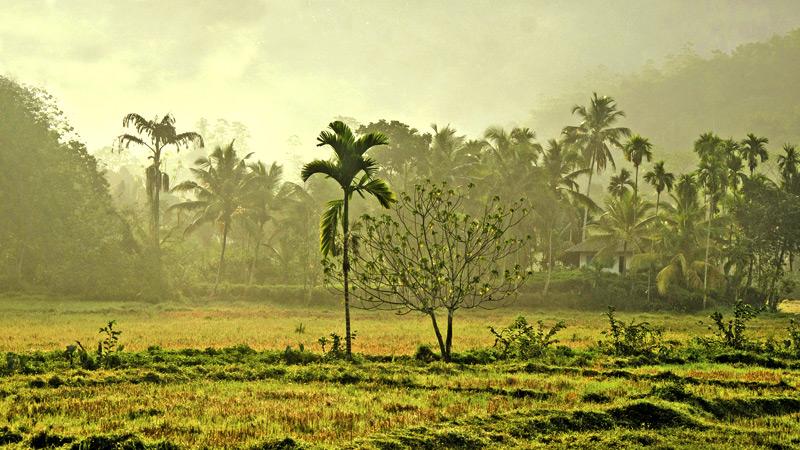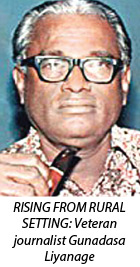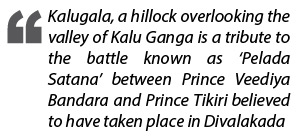
 “Bothalegama in the Bulathsinhala electorate is my birth place. The narrow tarred road starting from the Egaloya junction branches off near the Melwatta temple; one road leads to Yahalawatta ferry via Divalakada and the other stretches out to the Halwatura Plantation through Bothalegama. Across the Halwatura jetty of Kalu Ganga, the road on the other side leads to Ingiriya.
“Bothalegama in the Bulathsinhala electorate is my birth place. The narrow tarred road starting from the Egaloya junction branches off near the Melwatta temple; one road leads to Yahalawatta ferry via Divalakada and the other stretches out to the Halwatura Plantation through Bothalegama. Across the Halwatura jetty of Kalu Ganga, the road on the other side leads to Ingiriya.
“There is no public transport service on this road although hundreds of people travel daily. A private van owned by Ranasingha Ralahamy, of Athura Bus Company runs from Athura to Ingiriya via Bothalegama, thrice a day. Although the van has only 12 seats, more than 30-40 passengers travel on it, on each trip.”
 These are two paragraphs from Gunadasa Liyanage’s novel – ‘Dona Kamalawathie’, one of his best-selling Sinhala novels in the early 70s which was translated into English. It describes in detail his village Divalakada.
These are two paragraphs from Gunadasa Liyanage’s novel – ‘Dona Kamalawathie’, one of his best-selling Sinhala novels in the early 70s which was translated into English. It describes in detail his village Divalakada.
Driving to the remote part of Bulathsinhala in the south east corner of the Western Province is a surreal experience. Colours change with every curve in the mountains portraying a scenic picture along the valley of the Kalu Ganga. Vast stretches of paddy fields merge with lush low country tea and rubber plantations that suddenly morph into dense forests with streams rolling past alongside the plantations.
My journey started in Ratnapura, from where it was a long drive to Ingiriya, the turning point before reaching my destination - Divalakada. I crossed the Kalu Ganga on the bridge at Halwatura. It was mid morning as I reached Divalakada and I caught a glimpse of the farmers already harvesting paddy in their fields before the sun got harsh.
I was eager to peep into the rustic village of Divalakada, the birth place of Gunadasa Liyanage which is also important to me because it is in the adjoining village of Bothalegama that I was born and bred.
Divalakada, a picturesque village in the countryside opens up, rising through the gentle foothills to Kalugala, situated west of Bulathsinhala in the Kalutara district. Located just 72 kilometres southeast of Colombo, it is graced with a pleasant climate, picturesque river valley, lush dense jungles, stretches of bountiful golden paddy fields and gushing streams, with tea and rubber plantations easily accessible via Horana, Ingiriya or Matugama. Divalakada receives high rainfall, as is evident in its lush green vegetation.
Divalakada is one of the oldest villages in Bulathsinhala going back to the days of the monarchs and princesses, featured in the historical chronicle of Rajawaliya and is also described in Sunethra, a historical novel written by W.A.Silva.
The mighty Kalu Ganga flows west of Divalakada. Kalugala, a hillock overlooking the valley of Kalu Ganga is a tribute to the battle known as ‘Pelada Satana’ between Prince Veediya Bandara and Prince Tikiri believed to have taken place in Divalakada.
The warrior prince Veediya Bandara and his queen Sooriyadevi who had fled from Sitawaka mustered an army and weapons at Pelada in Palindanuwara and led a war against the Portuguese during the latter part of the 16th century.
According to historical notes, Prince Veediya Bandara led a battle against King Mayadunne, the ruler of Sitawaka and the Portuguese and attacked them from time to time, camping at Pelada. After the death of Princess Sooriyadevi, Prince Veediya Bandara married the sister of Prince Tikiri Kumaru (King Mayadunne’s daughter).

King Mayadunne also led a battle against Prince Veediya Bandara due to his cruelty to his daughter. The battle between Prince Veediya Bandara and Prince Tikiri is believed to have taken place at Divalakada near Bulathsinhala.
Even today, testimony to this historic event could be witnessed in the village where a generation of blacksmiths who made weapons for the battle and their descendants still live. The leftovers of the casting iron for making weapons in ancient times known as ‘Yabara’, (black gravels) are found in some places in the village. Some ancient coins were also found by villagers in Divalakada while digging the land for cultivation and these coins were handed over to the Department of Archaeology.
Divalakada boasts of a long history and folklore about its origins. In ancient times, this wooded area comprised marshy lands known as Diyavalakada which eventually became Divalakada, which is easier on the tongue.
Meanwhile, a young lad known as Liyanage Henchi Vidane, from Pelpola near Kalutara, who was wanted by the Police, had fled to hide in the wooded area of Diyavalakada where he found an ideal setting of caves and streams in the forest. He had lived in the caves feeding on the yams from the forest and later cleared the forest and built a house. Eventually, he married a young woman from Bulathsinhala which was the origin of the Liyanage generation in Divalakada. The first person who introduced the name of Divalakada to the outside world was the late Divalakada Ratanajothi Thera who had thoroughly researched on the village.
Later, the village of Divalakada was popularised by veteran newspaper editor, author, broadcaster and TV presenter Kalasuri Gunadasa Liyanage who was born there and grew up as a village lad where he had spent much of his childhood. He was the only son of Liyanage Methiyes Appuhamy of Divalakada, the older brother of Ven. Divalakada Ratanajothi Thera of Sri Keththarama Vihara at Divalakada.
Gunadasa Liyanage loved his beautiful village Divalakada and its simple villagers and found a rare peace and quietness there. When his mother was alive, he used to come to Divalakada every weekend to visit her and other relatives at ‘Arambe-gedara’ (a home situated in a grove) his ancestral home in Divalakada. Subsequently, he had built a small but beautiful house in the same place with quite a large pond damming a stream in the foothills of a wooded hill to spend his holidays with his family making it an attractive place.
Reaching this scenic land is not only an adventure in itself but also a reminiscence of my nostalgic memories.
The towering trees surrounding Arambe-gedara still loom in the backdrop of the lush greenery and fields. The figure of Gunadasa Liyanage who was raised in a rural setting still reverberates in the hearts of the villagers of Divalakada.
